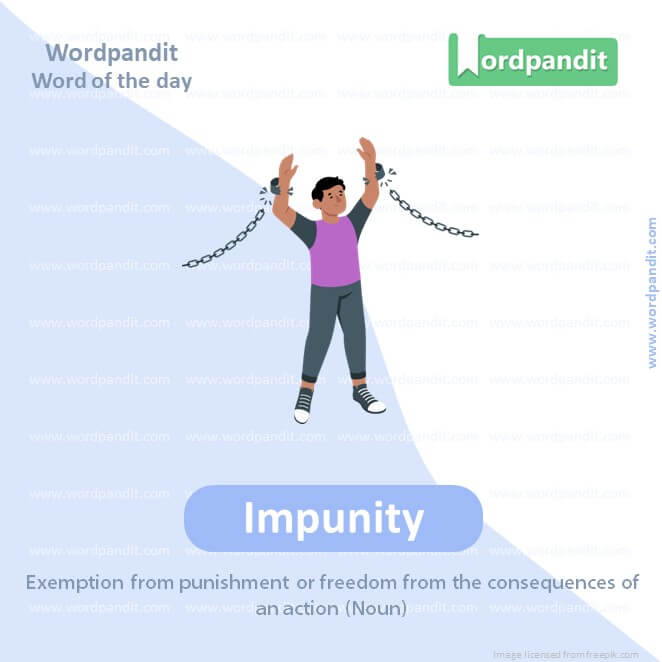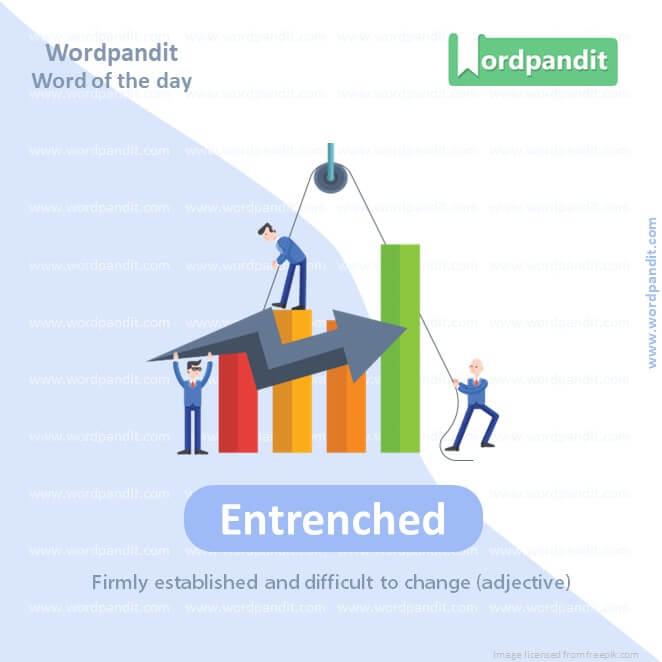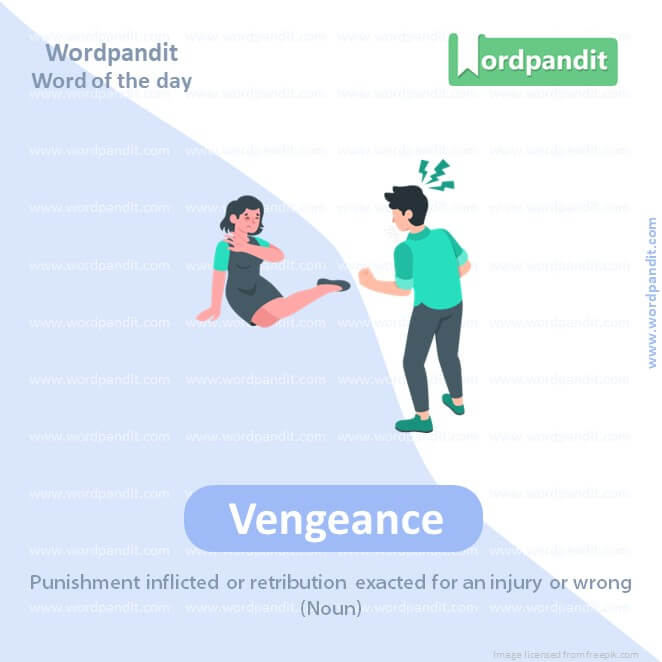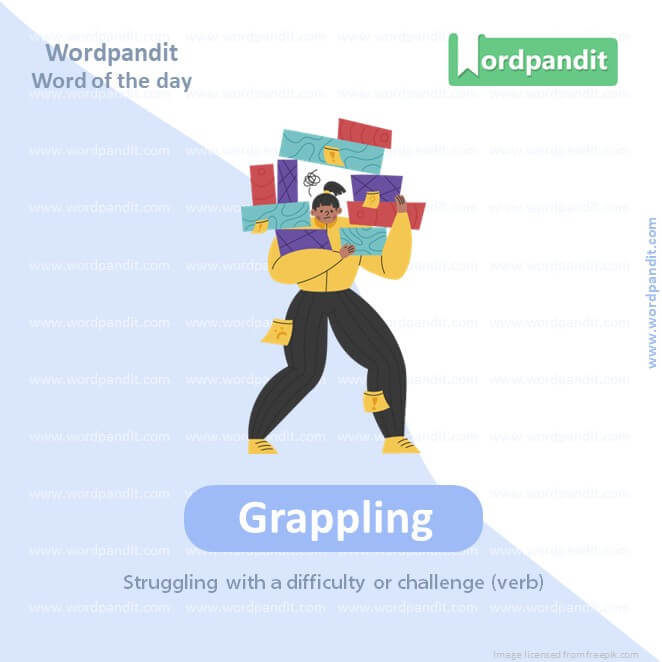Daily Vocabulary Words: List of Daily Used Words
Hi there. Welcome to this special section @ Wordpandit.
Our endeavour here is straightforward: highlighting important daily vocabulary words, you would encounter in The Hindu. This is your repository of commonly used words; essentially, we are posting a list of daily used words. Hence, this has significant practical application as it teaches you words that are commonly used in a leading publication such as The Hindu.
Visit the website daily to learn words from The Hindu.

WORD-1: Impunity
CONTEXT: The applause the verdict has received is a testament to the collective yearning for a justice system that stands unwavering against impunity.
SOURCE: The Hindu
Explanatory Paragraph: Imagine if you did something naughty, like taking a cookie without asking, and no one told you off for it. That means you wouldn’t get into trouble no matter what. “Impunity” is when someone does something wrong but doesn’t get punished or face any consequences, just like when you took that cookie and didn’t get a time-out.
Meaning: Exemption from punishment or freedom from the consequences of an action (Noun).
Pronunciation: im-PEW-ni-tee
Synonyms: Immunity, Exemption, Freedom, License, Exoneration, Liberty, Protection.
Usage Examples:
1. The thief robbed the store with impunity, knowing the security cameras were broken.
2. Because of diplomatic immunity, the diplomat could act with impunity while abroad.
3. The corrupt official acted with impunity, as he was protected by powerful friends.
4. Children sometimes believe they can break rules with impunity until they are taught otherwise.

WORD-2: Entrenched
CONTEXT: A Muslim woman navigating a society marked by entrenched biases against religious minorities and women, and how that has determined her relationship with justice.
SOURCE: The Hindu
Explanatory Paragraph: Imagine a sandcastle with a deep moat around it that makes it really hard for anyone to get close. “Entrenched” is like that moat around the castle. It’s when something, like a habit or a belief, is so deeply set in place that changing it is very difficult. Like how you might really believe in making your bed every morning, and no one can tell you otherwise.
Meaning: Firmly established and difficult to change (adjective).
Pronunciation: en-TRENCHED
Synonyms: Rooted, Ingrained, Fixed, Deep-seated, Firm, Embedded, Established.
Usage Examples:
1. The habit of waking up early is so entrenched in him that he never needs an alarm clock.
2. Entrenched beliefs about health are hard to change, even with new evidence.
3. The company’s entrenched position in the market makes it a leader in the industry.
4. Her fear of dogs was entrenched after a childhood incident.

WORD-3: Introspective
CONTEXT: Ms. Bano’s journey must serve as an introspective lens for us to think through the broader struggle towards justice, and how best we can serve survivors of sexual violence.
SOURCE: The Hindu
Explanatory Paragraph: Imagine sitting quietly and thinking really hard about what you did during the day, how you felt when your friend shared their toy, or why you got upset over a small thing. Being “introspective” means you’re like a detective for your own feelings and thoughts, trying to understand them better.
Meaning: Inclined to examine one’s own thoughts and feelings (adjective).
Pronunciation: in-troh-SPEK-tiv
Synonyms: Reflective, Self-examining, Contemplative, Meditative, Thoughtful, Pensive, Self-analyzing.
Usage Examples:
1. After the argument, she became introspective, wondering why she reacted so strongly.
2. He has an introspective personality, preferring quiet evenings of reflection.
3. The introspective book prompts readers to think about their own lives.
4. Writing in a journal is an introspective activity that can help you understand yourself better.

WORD-4: Vengeance
CONTEXT: punishment is to be inflicted not for the sake of vengeance but for the sake of prevention and reformation.
SOURCE: The Hindu
Explanatory Paragraph: Think about a time when someone took your toy and you wanted to take one of theirs not just to get back but to make them feel just as bad. “Vengeance” is a really strong word for trying to get back at someone for something wrong they did, wanting them to feel the pain or trouble they caused.
Meaning: Punishment inflicted or retribution exacted for an injury or wrong (Noun).
Pronunciation: VEN-juns
Synonyms: Revenge, Retaliation, Reprisal, Payback, Retribution, Revengeance, Vindication.
Usage Examples:
1. He swore vengeance against those who had wronged his family.
2. The movie’s plot revolves around a hero’s quest for vengeance.
3. She plotted her vengeance in silence, waiting for the perfect moment to act.
4. In his heart, he knew that vengeance would not bring peace.
WORD-5: Reintegration
CONTEXT: The professed objective of reformation and reintegration into society as responsible citizens rings hollow when one takes into account the glaring lack of essential resources and programmes within most Indian prisons.
SOURCE: The Hindu
Explanatory Paragraph: Imagine you had a long holiday and when you came back to school, you needed a little time to get used to your class schedule and friends again. “Reintegration” is just like that – it’s when someone or something is made to be a part of a group or situation again, fitting back in smoothly.
Meaning: The process of restoring something or someone to a former position or condition (noun).
Pronunciation: ree-in-tuh-GRAY-shun
Synonyms: Reassimilation, Reincorporation, Restoration, Reunification, Reestablishment, Resettlement, Reentry.
Usage Examples:
1. The program focuses on the reintegration of former soldiers into civilian life.
2. After studying abroad, she faced challenges in the reintegration into her home culture.
3. The reintegration of the fragmented parts into the artwork took months.
4. Successful reintegration into society is key for people released from prison.
WORD-6: Paradoxical
CONTEXT: It sheds light on the paradoxical relationship between feminism and the state, recognising the state as both a potential ally of patriarchy and a depriver of liberties.
SOURCE: The Hindu
Explanatory Paragraph: Suppose you have a tiny toy car that can move super fast. It’s strange because you don’t expect something so small to be so speedy. “Paradoxical” means something is surprising or seems opposite of what you would expect. It’s like saying, “Whoa, how can that tiny car be so fast?”
Meaning: Seemingly absurd or self-contradictory, but perhaps actually true (adjective).
Pronunciation: par-uh-DOX-i-kuhl
Synonyms: Contradictory, Ironical, Incongruous, Unexpected, Puzzling, Baffling, Confounding.
Usage Examples:
1. It’s paradoxical that the quietest person in the room often has the most to say.
2. The paradoxical nature of the statement puzzled everyone.
3. In a paradoxical twist, the fire station caught fire.
4. His approach to solving problems was paradoxical but effective.

WORD-7: Grappling
CONTEXT: India is grappling with the perils of carceral feminism. Feminists have been demanding stricter penalties under the law, without questioning why many women opt not to report cases of rape in the first place.
SOURCE: The Hindu
Explanatory Paragraph: Think about trying to hold on to a wiggly puppy that doesn’t want to take a bath. “Grappling” means you’re trying really hard to hold or deal with something, especially when it’s tough or challenging. It’s like catching something that keeps slipping away.
Meaning: Struggling with a difficulty or challenge (verb).
Pronunciation: GRAP-ling
Synonyms: Wrestling, Struggling, Contending, Tussling, Striving, Battling, Coping.
Usage Examples:
1. She was grappling with the decision of whether to move to a new city for her job.
2. The two wrestlers were grappling for the championship title.
3. They spent hours grappling with the complex mathematical problem.
4. As a new parent, he’s grappling with lack of sleep and constant worry.
WORD-8: Patriarchy
CONTEXT: The deeply rooted mistrust in the criminal justice system stems from the entrenched patriarchy which grips each institution of the criminal legal system, starting from their encounters with the police to interactions with medical officers and the judiciary, which cannot adequately be addressed through exclusive reliance on legal reforms and punitive measures.
SOURCE:The Hindu
Explanatory Paragraph: Imagine a family where the grandpa, dad, or uncles make all the big decisions and are in charge most of the time. “Patriarchy” is a big word that means a system or society where men, especially older men, have the power and are the main decision-makers.
Meaning: A social system or government where men hold most of the power and importance (noun).
Pronunciation: PAY-tree-ar-kee
Synonyms: Male dominance, Father-rule, Androcracy, Male governance, Man’s world, Male supremacy.
Usage Examples:
1. The novel explores the effects of patriarchy on individual freedom.
2. In a patriarchy, women often struggle to achieve equal representation.
3. The movement aimed to challenge the traditional patriarchy in society.
4. Historical evidence suggests that patriarchy has been prevalent in many cultures.
WORD-9: Retraumatising
CONTEXT: Sociologist and feminist legal scholar Pratiksha Baxi aptly describes the rape trial as “pornographic,” revealing the retraumatising nature of the questions survivors endure, which perpetuates a culture of victim-blaming.
SOURCE: The Hindu
Explanatory Paragraph: Imagine you fell off your bike and got a big scratch. It hurt a lot the first time. Then, if you fall again and get hurt in the same place, it’s like the scratch got worse. “Retraumatising” is when something happens that makes a bad or scary memory feel fresh and painful again, just like that scratch.
Meaning: Causing a person to experience trauma again or recall a traumatic event in a distressing way (verb).
Pronunciation: ree-TRAW-muh-ty-zing
Synonyms: Re-traumatizing, Re-injuring, Re-victimizing, Reopening old wounds, Re-triggering.
Usage Examples:
1. Watching the news about the accident was retraumatising for him.
2. The court trial ended up retraumatising the witness, forcing her to relive the event.
3. It’s important for counselors to avoid retraumatising their clients during therapy.
4. Certain movies can be retraumatising for people who have experienced similar situations.
WORD-10 Insinuating
CONTEXT Such questions serve to gaslight survivors, insinuating that their actions or choices somehow warranted the heinous crime perpetrated against them.
SOURCE: The Hindu
Explanatory Paragraph: Imagine if your friend whispered that someone might have taken the last piece of cake without saying who. They’re kind of suggesting someone did it without actually saying it directly. “Insinuating” is when you hint or suggest something, especially something not so nice, in a roundabout way.
Meaning: Suggesting or hinting at something, usually in a negative or indirect manner (verb).
Pronunciation: in-SIN-you-ay-ting
Synonyms: Implying, Suggesting, Hinting, Alluding, Inferring, Intimating, Connoting.
Usage Examples:
1. His tone was insinuating that she was not telling the truth.
2. The article was insinuating corruption without providing direct evidence.
3. She found his insinuating remarks about her work ethic to be offensive.
4. The novel was full of insinuating references to the scandal.
Vocabulary Meaning and Examples
In the fascinating world of language learning, a method particularly impactful is learning ‘vocabulary meaning and examples’. Harnessing this dual approach of understanding words through definitions and relevant examples yields a sound vocabulary grasp. Let’s explore how we can effectively learn vocabulary using ‘meaning and examples’.
Foremost, recognizing ‘meaning and examples’ involves more than just a surface glance at the definition. It requires an engaged interaction with the word, placing it within a proper context. This enriches comprehension and facilitates an innate understanding of the word’s applications.
The process of learning ‘meaning and examples’ is made highly effective through varied resources. Reading literature, online articles, and language learning platforms offer numerous examples enriching the meanings. By frequently encountering a word in various contexts, the understanding of the ‘meaning and examples’ deepens, imprinting the word into long-term memory.
When learning ‘meaning and examples’, creating personal sentences is recommended. Develop your own examples using the given word. This personal connection between learned vocabulary and your everyday life context strengthens both familiarity and recall.
Moreover, taking notes while studying ‘meaning and examples’ goes a long way in mastering vocabulary. Jotting down the definition and a couple of examples for reference leads to better recall during revisions.
Finally, teach to learn. A tried-and-true method to solidify ‘meaning and examples’ is by explaining the word to someone else. This exercise forces you to articulate the word’s usage and understanding clearly, embedding it further in your memory.
In conclusion, the journey to learn ‘vocabulary meaning and examples’ is a rewarding process that involves a multifaceted approach. As you dive into the rich experience of understanding words through ‘meaning and examples’, you uncover the nuance and depth of language, enabling you to master it in its true sense.






